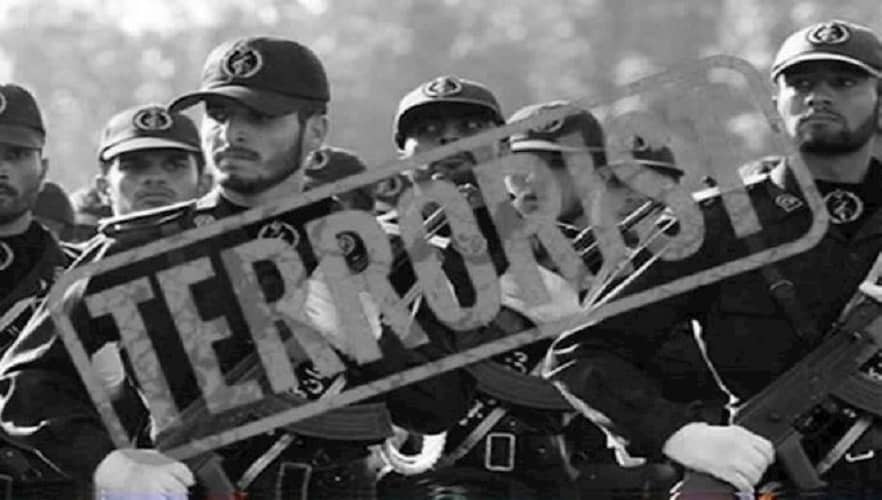The US’s blacklisting IRGC and its eventual consequences captured the headlines last week.
By Mahdavi
A turning point designation
The formal announcement of blacklisting the IRGC, the first-ever in its kind, and its coming into effect is a significant development. Although blacklisting IRGC has been long overdue, it is important and must be regarded as a decisive turning point.
On the first anniversary of the US withdrawal from the nuclear deal, aka Joint Comprehensive Plan of Action (JCPOA), the pressure on Iran, augmented by the new act of blacklisting IRGC, drives the clerical regime into a new phase. Soon, we will witness the consequences of blacklisting of IRGC that affects the regime much harsher than the US withdrawal from JCPOA.
The role of Iran’s resistance in blacklisting IRGC
It should be noted that over the past years, the Iranian Resistance, particularly Mrs. Maryam Rajavi, the president-elect of the National Council of Resistance of Iran (NCRI), has conducted a tireless campaign calling for an end to the West’s appeasement policy towards the Iran regime and blacklisting its IRGC by the US and European states, for its role in domestic repression as well as exporting terrorism and fundamentalism abroad.
Indeed, realizing such an important development is one of the greatest diplomatic achievements for Iran’s resistance, and is for Iran and the Iranian nation’s national and historical benefits.
The significant consequences of blacklisting IRGC
As a result of blacklisting IRGC, the primary arm of the clerical regime for repression, suppression and will be subjected to political, military, financial, and communication pressures.
Considering the IRGC’s role in Iran’s economy, which owns a huge share in the national financial sector, blacklisting IRGC, is a crippling blow to the regime’s apparatus of plundering and embezzlement.
By blacklisting IRGC, the misguided appeasement policy is doomed to fail which is of benefit to the countries that are suffering from the criminal meddling of the IRGC and its terrorism, both in the region and beyond it.
Blacklisting IRGC will change the final balance of power inside Iran in favor of the Iranian people’s uprisings and their organized resistance, PMOI/MEK. At the same time, blacklisting IRGC will turn the international spotlight on this terrorist entity as the main problem of Iran, the Middle East, and Asia.
Regime’s officials’ reaction; muddying the waters
To minimize the psychological effects on their frustrated forces, the regime’s officials and organizations have resorted to silly shows of saber-rattling.
According to the official IRNA news agency on Monday, April 8, the regime’s Supreme National Security Council considers the US government as the “state sponsor of terrorism” and has announced the US Central Command forces in West Asia (CENTCOM) as a “terrorist group”.
Mohammed Javad Zarif, regime’s Foreign Minister, advised his boss, Hassan Rouhani on Monday, April 8, to place US forces in Western Asia on Tehran’s list of “terrorist” groups.
These regime’s insubstantial measures, with no practical support, may have just domestic propaganda impact; but in the international community, no one gives them any serious consideration.
Heresy and peril
Apart from theatrical bragging, there is a lot of official’s concern over blacklisting IRGC. Seyyed Javad Sadatinejad, the representative of Kashan and Aran and Bidgol in the regime’s Majlis (parliament), called the US act as a “Dangerous heresy in the international arena”. He said: “Blacklisting IRGC is a dangerous heresy in the international arena and will surely lead to the Islamic Republic’s serious counteraction. The US troops and military centers will be identified by Iran (regime) as terrorist targets, and targeting them will be legitimate.”
No need to say that the concepts of ‘heresy’ and ‘international danger’ are indirectly pointing to the failure of the appeasement policy towards the mullahs and changing the global balance of power to the detriment of the clerical regime.
Blacklisting IRGC is the beginning of a new chapter in the relationship between the US, and indeed, the entire international community, regarding the Iran regime which drives it to the brink of overthrow.
Also, blacklisting IRGC is the political fruit of the Iranian resistance’s disclosure of the role of IRGC in domestic repression, export of terrorism and fundamentalism abroad, and destabilizing the Middle East. Mrs. Maryam Rajavi, the President-elect of Iran Resistance, stated: “This action, which was long overdue, should now be completed by designating the Iranian regime’s Ministry of Intelligence and Security (MOIS).”
